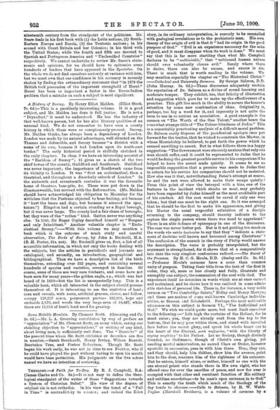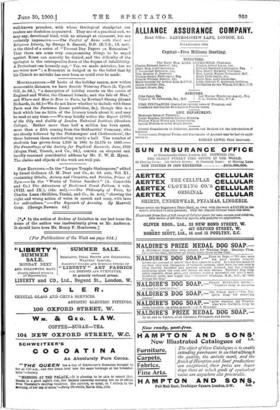TELEOLOGT.—A. Faith for To - Day. By R. J. Campbell, B.A. (James
Clarke and Co. 69.)—It is not easy to define the theo- logical standpoint of the writer of these "Suggestions towards a System of Christian Belief." His view of the dogma of original sin is not orthodox. In his view the tenet of a "Fall in Time" is contradict.)ry to ssiene ; and indeed the Eden story, in its ordinary interpretation, is scarcely to be reconciled with geological revelations as to the prehistoric man, His own theory of the origin of evil is that it "had its origin in the good purpose of God." "Evil is an experience necessary for the sake of good, and it must disappear when its work is done." We must say tbat this is far more startling than what Mr. Campbell declares to be "unthinkable," that "unbiassed human nature should ever voluntarily choose evil." Surely where there is desire, there can also be excess, and excess is sin. There is much that is worth reading in the volume. We may mention especially the chapter on" The Historical Christ." —Cathedral and University Sermons. By George Salmon, D.D. (John Murray. 3s. 6d.)—These discourses adequately sustain the reputation of Dr. Salmon as a divine of sound learning and moderate temper. They exhibit, too, that felicity of illustration and suggestion which goes far to make up the effectiveness of a preacher. This gift lies much in the ability to secure the hearer's attention by some new combination of ideas. Originality is, perhaps, too big a word for it, and ingenuity is not quite the term to use in so serious an association. A good example is the sermon on "The Worth of the One Talent," anether bears the somewhat strange title of "The Colour-blindness of Judas." This is a remarkably penetrating analysis of a difficult moral problem. Dr. Salmon easily disposes of the paradoxical apologia once put forward for the traitor, that he wished to constrain the Master, in whose Messiahship he believed, to put forth the power which he seemed unwilling to assert. But in what follows there is a happy suggestion: "The Government were sincerely anxious that only one man should suffer, and it could be represented to Judas that he would be doing the greatest possible service to his companions if he helped to have the arrest made quietly. It seems to me no impossible supposition that a promise was made to Judas that in return for his service his companions should not be molested. How else was it that, notwithstanding Peter's attempt at rescue, he and the rest were allowed to make their escape quietly ? From this point of view the betrayal with a kiss, one of the features in the incident which shocks us moat, may probably have been regarded by Judas himself as the most creditable part of his conduct. All the rest would be saved if only one were taken; but that one must be the right one. So it was arranged that he should be the first to make his appearance, and giving his Master the usual respectful salutation of a disciple returning to the company, should thereby indicate to the captors the single person whom there was need to apprehend." There is an able defence of episcopacy in one of the discourses. The case SSW never better put. But is it not putting too much on the words tau*, ogoxoyfav to say that they "indicate a state- ment of doctrine well known and honoured among Christians"? The confession of the eunuch in the story of Philip would answer the description. The verse is probably interpolated, but the argument is strengthened, for it shows that at a comparatively late date the very simplest confessions sufficed.—The Secret of the Presence. By H. C. G. Moule, D.D. (Seeley and Co. 3s. 6d.) — Professor Moule's sermons have a more than common unity of purpose. Taking their title from the text of the first in order, they all, more or less closely and fully, illustrate and exemplify one subject, the communion of the soul with God. The experience itself he describes in words which are at once earnest and restrained, and he shows how it was realised in some admir- able sketches of personal life. There is, for instance, a very noble sermon on "Two Cambridge Saints," Ridley and Henry Martyn ; and there are notices of some well-known Cambridge individu- alities, as Simeon and Scholefield. Perhaps the most noticeable utterance on this subject is Sermon VI., "The Individual and God." We wish we could quote more, but must limit ourselves to the following :—" Lift high the curtains of the Holiest, for he must enter; yea, they are already rent from the top to the bottom, that he may pass within them, and stand with unveiled face before the secret glory, and speak his whole heart out to the heart of the Eternal, aera vaiipncriar, with the liberty of saying anything' to his Father. Let no Society, though divinely founded, no Ordinance, though of Christ's own giving, yet needing mortal ministration, no sacred Class or Order, however apostolic in succession, pass in with him there. True, they can, and they should, help him thither, show him the avenue, point him to the door, reassure him of the rightness of his entrance. But he enters, himself alone, or rather, himself as one with the one eternal priest who stands there in His own right, who has offered once for ever the sacrifice of peace, and now -for ever is occupied with that other and resultant function of His solitary and sublime sacerdotium—to be man's open entrance in to God." This is exactly the truth Which 'much of the theology of the day tends to obscure.—Ccals to Holiness, by H. W. Webb- Peploe (Marshall Brothers), is a volume of sermons by a well-known preacher, with whose theological standpoint our readers are doubtless acquainted. They are of a practical and, we may say, devotional kind, with no attempt at ornament, but are certainly impressive. —The Conflict of Rome with Cirit and Religious Liberty, by George S. Barrett, D.D. (R.T.S., 1d. net), is the third of a series of "Present Day Papers on Romanism." That there are some very compromising things to be urged against Rome can scarcely be denied, and the difficulty of the apologist is the retrospective force of the dogma of infallibility. A Protestant can honestly say," Yes, we made mistakes, but we are wiser now " ; a Romanist is hedged in to the belief that by his Church no mistake has ever been or could ever be made.



















































 Previous page
Previous page